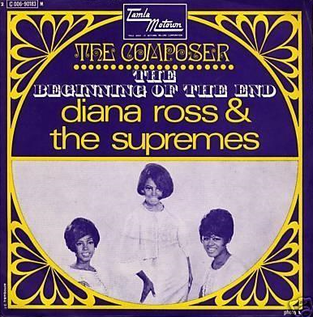"Someday We'll Be Together" is a song written by Johnny Bristol, Jackey Beavers, and Harvey Fuqua. It was the last of twelve American number-one pop singles for Diana Ross & the Supremes on the Motown label. Although it was released as the final Supremes song featuring Diana Ross, who left the group for a solo career in January 1970, it was recorded as Ross' first solo single and Supremes members Mary Wilson and Cindy Birdsong do not sing on the recording. Both appear on the B-side, "He's My Sunny Boy".

"Stop! In the Name of Love" is a 1965 song recorded by the Supremes for the Motown label.

"Reflections" is a 1967 song recorded by American soul music group The Supremes for the Motown label. The single release was the first Supremes record credited to "Diana Ross and the Supremes", and the song was one of the last Motown hits to be written and produced by Holland–Dozier–Holland before they left the label.

"Baby Love" is a song by the American music group the Supremes from their second studio album, Where Did Our Love Go. It was written and produced by Motown's main production team Holland–Dozier–Holland and was released on September 17, 1964.

"Come See About Me" is a 1964 song recorded by the Supremes for the Motown label. The track opens with a fade-in, marking one of the first times the technique had been used on a studio recording.

"Love Child" is a 1968 song released by the Motown label for Diana Ross & the Supremes. The second single and title track from their album Love Child, it became the Supremes' 11th number-one single in the United States, where it sold 500,000 copies in its first week and 2 million copies by year's end.

"I Hear a Symphony" is a 1965 song recorded by the Supremes for the Motown label.

"I'm Gonna Make You Love Me" is a soul song most popularly released as a joint single performed by Diana Ross & the Supremes and the Temptations for the Motown label. This version peaked for two weeks at No. 2 on the Hot 100 in the United States, selling 900,000 copies in its first two weeks, and at No. 3 on the UK Singles Chart in January 1969.

"Up the Ladder to the Roof" is a 1970 hit single recorded first by The Supremes for the Motown label. It was the first Supremes single to feature new lead singer Jean Terrell in place of Diana Ross, who officially left the group for a solo career two weeks before the recording of this song in January 1970. This song also marks a number of other firsts: it is the first Supremes single since "The Happening" in 1967 to be released under the name "The Supremes" instead of "Diana Ross & The Supremes", the first Supremes single solely produced by Norman Whitfield associate Frank Wilson, and the first Supremes single to make the United Kingdom Top 10 since "Reflections" in 1967.

"I'm Livin' in Shame" is a 1969 song released for Diana Ross & the Supremes on the Motown label. The sequel to the Supremes' number-one hit, "Love Child," the song peaked in the top ten on the US Billboard Hot 100 pop chart at #10 and the top 20 in the UK at #14 in April and May 1969.

"Love Is Here and Now You're Gone" is a 1967 song recorded by the Supremes for the Motown label.

"Love Is Like an Itching in My Heart" is a 1966 song recorded by the Supremes for the Motown label.

"Forever Came Today" is a 1968 song written and produced by the Motown collective of Holland–Dozier–Holland, and was first made into a hit as a single for Diana Ross & the Supremes in early 1968. A disco version of the song was released as a single seven years later by Motown group the Jackson 5.

"Nothing but Heartaches" is a 1965 song recorded by the Supremes for the Motown label.

"In and Out of Love" is a 1967 song recorded by The Supremes for the Motown label. It was the second single issued with the group's new billing of Diana Ross & the Supremes, the penultimate Supremes single written and produced by Motown production team Holland–Dozier–Holland, and the last single to feature the vocals of original member Florence Ballard.

"The Composer" is a 1969 song released for Diana Ross & the Supremes by the Motown label.

"I'll Try Something New" is a song written by Smokey Robinson and originally released in 1962 by The Miracles on Motown Records' Tamla subsidiary label. Their version was a Billboard Top 40 hit, peaking at #39, and just missed the Top 10 of its R&B chart, peaking at #11. The song was released later as a joint single by Diana Ross & the Supremes and The Temptations, also becoming a charting version on the Billboard 100 pop singles chart, peaking for two weeks in April 1969 at number 25.

"Everybody's Got the Right to Love" is a socially conscious–inspired pop song written by Lou Stallman, produced by Frank Wilson and released as a single in 1970 by Motown group The Supremes, who took the song into the top forty in mid-1970 following the release of "Up the Ladder to the Roof".

"Some Things You Never Get Used To" is a song released in 1968 by Diana Ross & the Supremes on the Motown label. The single stalled for three weeks at number 30 on the U.S. Billboard pop chart in July 1968. It became the lowest-charting Supremes single since 1963 and became the catalyst for Berry Gordy to revamp songwriting for The Supremes since the loss of Motown's premier production team Holland–Dozier–Holland, which Gordy had assigned as the group's sole producers after the success of "When the Lovelight Starts Shining Through His Eyes."

"Where Did Our Love Go" is a 1964 song recorded by American music group the Supremes for the Motown label.



















